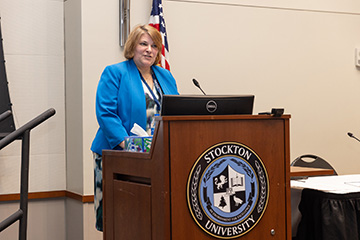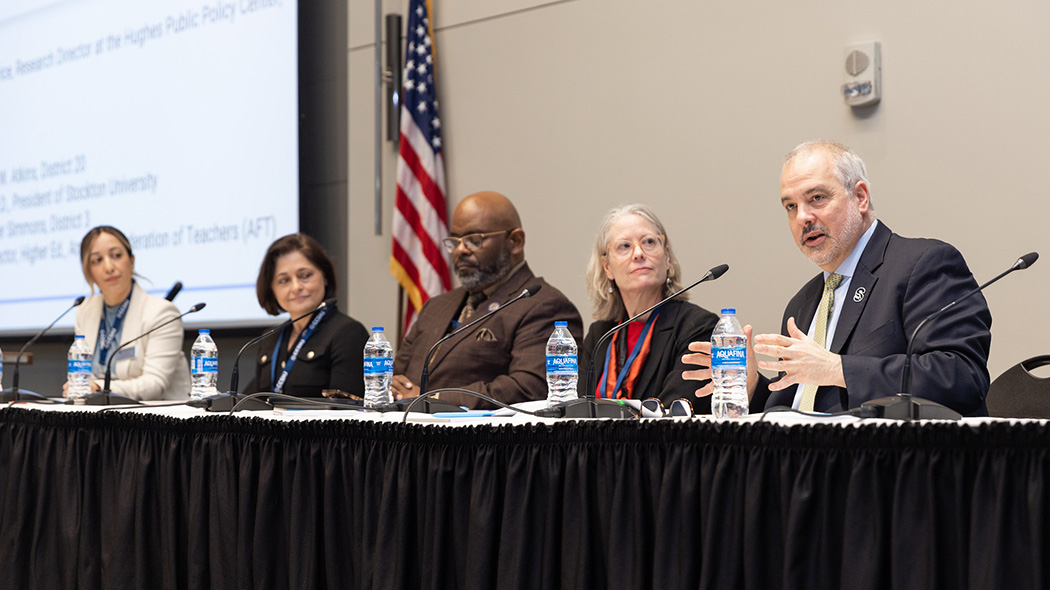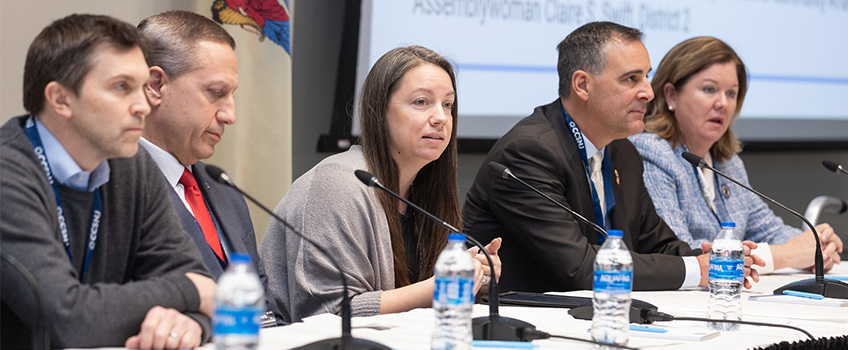Galloway, N.J. — How important are public colleges and universities in New Jersey?
They generate $6 billion in economic activity and contribute $220 million in tax revenue
to the state each year.
For every $1 million invested in the seven public institutions of higher education,
including Stockton University, $16 million in economic activity is generated, supporting
about 36,000 jobs in the Garden State, according to the New Jersey Association of
State Colleges and Universities (NJASCU).

Colleges and Universities (NJASCU) was the keynote speaker at the conference.
“These institutions not only shape the future of our workforce, but also act as a
stabilizing influence, ensuring access to an affordable, high-quality education in
the face of shifting national priorities,” said NJASCU Executive Director Jennifer
Keyes-Maloney. “Now more than ever, they deserve the attention, resources and support
to continue their essential mission.”
Keyes-Maloney was the keynote speaker at a conference titled “The Power of Public
Colleges and Universities: Preserving and Advancing New Jersey’s Higher Education
Landscape.” The event was held Feb. 26 at Stockton and attended by about 90 state
legislators and community and higher education leaders. Among the legislators who
participated in the panel discussions were State Senator Vince Polistina, Assemblywoman
Claire Swift and Assemblyman Don Guardian.
Stockton President Joe Bertolino initiated the conference because he felt it was important
to bring state stakeholders together to discuss the best ways to strengthen and revitalize
New Jersey’s public higher education system into the future.
“Ultimately, we share a common mission and that is to ensure that our public colleges
and universities remain strong, they remain accessible and prepared to meet the evolving
needs of our students, our workforce and our communities,” he said.
Bertolino believes that higher education and the perception of its value is at a crossroads.
“We are grappling with declining enrollment, shifting workforce demands, a changing
financial landscape and most significantly the influence from an impact of federal
regulations and changes to both policies and funding have presented significant challenges
to our institutions,” he said.
“However, amidst all these challenges, one fact remains: Our New Jersey public colleges
and universities are engines for economic growth. We prepare thousands of students
each year. Students who go on to fuel our workforce, lead our businesses and serve
in our communities.”

The discussion was led by moderator Alyssa Maurice, the research director of the William
J. Hughes Center for Public Policy. The panel consisted of, from left, State Assemblywoman
Heather Simmons, State Assemblyman Reginald Atkins, Julie Schmid, senior director,
higher education at the American Federation of Teachers, and Stockton University President
Joe Bertolino.
The event consisted of four panel discussions on how higher education can be an economic
engine, how colleges and universities serve different populations and drive social
mobility, how alums from New Jersey schools have benefitted from a public education,
and how legislation can strengthen these institutions.
In the first panel, Vincent D’Alessandro, director of Government Banking at OceanFirst
Bank, talked about how his company prioritizes involvement with higher education institutions
to mentor and support students. Since 2017, the bank’s foundation has awarded $320,000
in scholarships to Stockton students, but there are challenges.
“Trying to find talent is an absolute battle. I’m here today to talk about solutions
to keep these kids in New Jersey and to keep them engaged,” he said.
Oliver Cooke, professor of Economics at Stockton, added that higher education institutions
are community anchors that are critical to the future of their regional economy.
“Continuing to invest significant dollars (in colleges and universities) is something
we have to do. The most recent data shows individuals with a bachelor’s degree earn
$66,000 annually while those without earn $42,000,” he said.
PANELISTS:
NJ Public Colleges and Universities as Economic Engines
Moderator: Jose Lozano, vice-chair for the Stockton Board of Trustees and executive vice-president/chief
growth officer for Hackensack Meridan Health
Michael Charlton, president of AtlantiCare
Oliver Cooke, Stockton University professor of Economics
Vincent D’Alessandro, director of Government Banking at OceanFirst Bank
Senator Vincent J. Polistina
Jacquelyn A. Suarez, commissioner of the Dept. of Community Affairs
Assemblywoman Claire S. Swift
Equity, Access and Community Impact
Moderator: Nicole Pacera, director of Education & Workforce Development at the Chamber of Commerce
for Southern New Jersey
Assemblyman Donald A. Guardian
Assemblywoman Andrea Katz
Michael Egenton, executive vice president of Government Relations for the New Jersey
Chamber of Commerce
Cindy R. Jebb, president of Ramapo College of New Jersey
Social Mobility, Lifelong Impact and Reinvesting in the Region
Moderator: Assemblywoman Jessica Ramirez ’98
Diane Juliano ‘ 99, chief nursing officer for Jefferson Health
Juliana Lodono, Ramapo College of New Jersey alumna, licensed and bilingual mental
health therapist
Dave Sholler ’06, Stockton alum and chief communications officer for the Philadelphia
76ers and Harris Blitzer Sports Entertainment
Capstone Panel on Policy Challenges and Legislative Solutions
Moderator: Alyssa Maurice, research director for the William J. Hughes Center of Public Policy
at Stockton University
Assemblyman Reginald W. Atkins
Joe Bertolino, president of Stockton University
Julie Schmid, senior director of Higher Education for the American Federation of Teachers
In the discussion about Equity, Access and Community Impact, Ramapo College President
Cindy Jebb said colleges and universities play a key role in driving social mobility
and urban development.
“I have been blown away when we have students bring their entire extended family to
an open house. We have to think about the impact of education on a whole community,
especially if they are first generation. We are not just transforming that student,
but an entire family and a community,” she said.
Stockton and Ramapo alumni who were the first in their families to attend college
echoed that value in a panel discussion on Social Mobility, Lifelong Impact and Reinvesting
in the Region.
“Statistically, I should not have graduated high school,” said Juliana Londoño, who
grew up in Paterson. “But I went to Ramapo and graduated in three years. Ramapo was
the beginning and is what propelled me.”
The 2019 graduate is now a licensed mental health therapist, entrepreneur and published
author.
Similarly, Dave Sholler, ’06, said his experience at Stockton broke the generational
cycle of poverty and addiction he grew up in. He was a first-generation student. Nearly
half of all of Stockton’s 7,565 undergraduate students identify as first-generation,
or the first in their family to attend a college or university.
“I found professors and administrators willing to commit the resources to me as a
young man trying to find a way out,” he said.
Sholler said Stockton helped him get an internship with the Philadelphia 76ers in
2004, and 20 years later he is the chief communications officer for the 76ers and
Harris Blitzer Sports Entertainment
“For me, so much of the conversation is how do we create good educational and life
habits today that connect to the public university? Growing up in a trailer park,
no one was educated. The real gap was the funding for education,” Sholler said. “It
is really simple. If we do not prioritize access for higher education, we will continue
this vicious cycle.”
The final panel focused on some of the policy challenges colleges and universities
face and possible legislative solutions, especially to address the challenge of keeping
college-bound New Jersey students in the state.
Assemblywoman Heather Simmons, who represents Salem and Cumberland counties, talked
about how increased dual-credit programs at universities can not only make higher
education more affordable but can bring a positive on-campus experience to prospective
New Jersey high school students.
“Where there is quality, affordable, accessible higher education, there are other
opportunities for creation of wealth, for investment of industry, for job creation
and for investment in everything from health care to utilities to infrastructure and
public transportation,” Simmons said.
When asked what the three most important things that New Jersey colleges and universities
must address, Bertolino said it was easy — “access, access, access.”
“And fourth, we need to present a clear value proposition of why higher education
matters,” he said. “We are the opportunity for these students. When our students graduate
from an institution in the state of New Jersey, 85% of those students are going to
stay in the state. I often remind legislators to invest in higher education because
one, they’re going to be your voters and two they’re going to be your employers, employees
and the tax base.”
— Story by Mark Melhorn and Stacey Clapp, photos by Susan Allen



